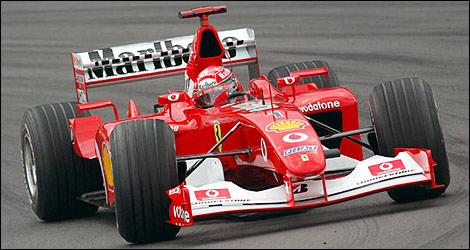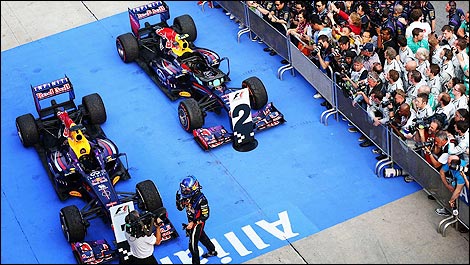Apr
8th
Stay connected Subscribe to our RSS feed
There seems something strange about Formula 1 this year. Much like it was after the opening races of 2006; there's no Michael Schumacher, a man who had become part of the F1 furniture after 21 years of involvement in the sport and two careers.
Whilst Schumacher failed to reach the successes he experiences with Ferrari during his return to the sport with Mercedes, there was something comforting about having him back. It was like having a favourite pair of shoes; an element of comfort, if you will...
... and now he's gone. And that's sad.
Whilst Michael - in the early to mid 2000s - didn't manage to win himself any fans by dominating Formula 1 in a fashion we're unlikely to ever see again, it's this dominance which is something worthy of celebration.
Instead of lambasting him for making the sport boring, how he managed to make Ferrari an organic entity, a place where driver and team, car and tyres became one unit should be saluted.
In light of the Multi-21 scandal at Red Bull and his retirement, it seems an appropriate time to give one of F1's most polarizing characters a revision. History has a habit of being kind to winners.
It seems impossible to think that Schumacher would have gone against the team in such a fashion like Vettel or publically trashed the team like Webber in the aftermath. Whilst Schumacher put in some ethically dubious performances in his career, it seems unthinkable that he would have bitten the hand that made him the statistically most successful driver in history.
It was Schumacher's spirit in losing that galvanized the team to do their best for him because they knew that irrespective of triumph or defeat, he would make sure they lose together and win together. Naturally, the relationship between team and driver became one of the closest in history and when people are happy, they perform at their best.
This is why the Ferrari/Schumacher era should be celebrated; it was a time of joy within Ferrari, a unit of people striving for one goal, a time when the relationship between driver, car and team was so symbiotic they reached a level of perfection which is unlikely to ever be witnessed again in F1.
So whilst Sebastian Vettel and Red Bull could be well on their way to usurping Michael's seven titles and 91 wins by turning in consistently stunning performances and smashing records, the Red Bull/Vettel partnership is something that isn't yet on a par with the dominance shown by Michael and Ferrari. The division of camps Vettel and Webber in Milton Keynes are evidence of this and for as long the team continues to operate in this fashion, then Red Bull will have a long way to go in terms of reaching the level of perfection achieved by Schumacher and Ferrari in the mid to early 2000s.
Whilst Schumacher failed to reach the successes he experiences with Ferrari during his return to the sport with Mercedes, there was something comforting about having him back. It was like having a favourite pair of shoes; an element of comfort, if you will...
... and now he's gone. And that's sad.
Whilst Michael - in the early to mid 2000s - didn't manage to win himself any fans by dominating Formula 1 in a fashion we're unlikely to ever see again, it's this dominance which is something worthy of celebration.
 |
| Michael Schumacher, F2002. (Photo: Ferrari) |
Instead of lambasting him for making the sport boring, how he managed to make Ferrari an organic entity, a place where driver and team, car and tyres became one unit should be saluted.
In light of the Multi-21 scandal at Red Bull and his retirement, it seems an appropriate time to give one of F1's most polarizing characters a revision. History has a habit of being kind to winners.
It seems impossible to think that Schumacher would have gone against the team in such a fashion like Vettel or publically trashed the team like Webber in the aftermath. Whilst Schumacher put in some ethically dubious performances in his career, it seems unthinkable that he would have bitten the hand that made him the statistically most successful driver in history.
It was Schumacher's spirit in losing that galvanized the team to do their best for him because they knew that irrespective of triumph or defeat, he would make sure they lose together and win together. Naturally, the relationship between team and driver became one of the closest in history and when people are happy, they perform at their best.
This is why the Ferrari/Schumacher era should be celebrated; it was a time of joy within Ferrari, a unit of people striving for one goal, a time when the relationship between driver, car and team was so symbiotic they reached a level of perfection which is unlikely to ever be witnessed again in F1.
So whilst Sebastian Vettel and Red Bull could be well on their way to usurping Michael's seven titles and 91 wins by turning in consistently stunning performances and smashing records, the Red Bull/Vettel partnership is something that isn't yet on a par with the dominance shown by Michael and Ferrari. The division of camps Vettel and Webber in Milton Keynes are evidence of this and for as long the team continues to operate in this fashion, then Red Bull will have a long way to go in terms of reaching the level of perfection achieved by Schumacher and Ferrari in the mid to early 2000s.
 |
| One-two finish in Malaysia, but no joy at Red Bull. (Photo: WRi2) |
 The latest auto news, reviews, prices, product and vehicle releases.
The latest auto news, reviews, prices, product and vehicle releases.